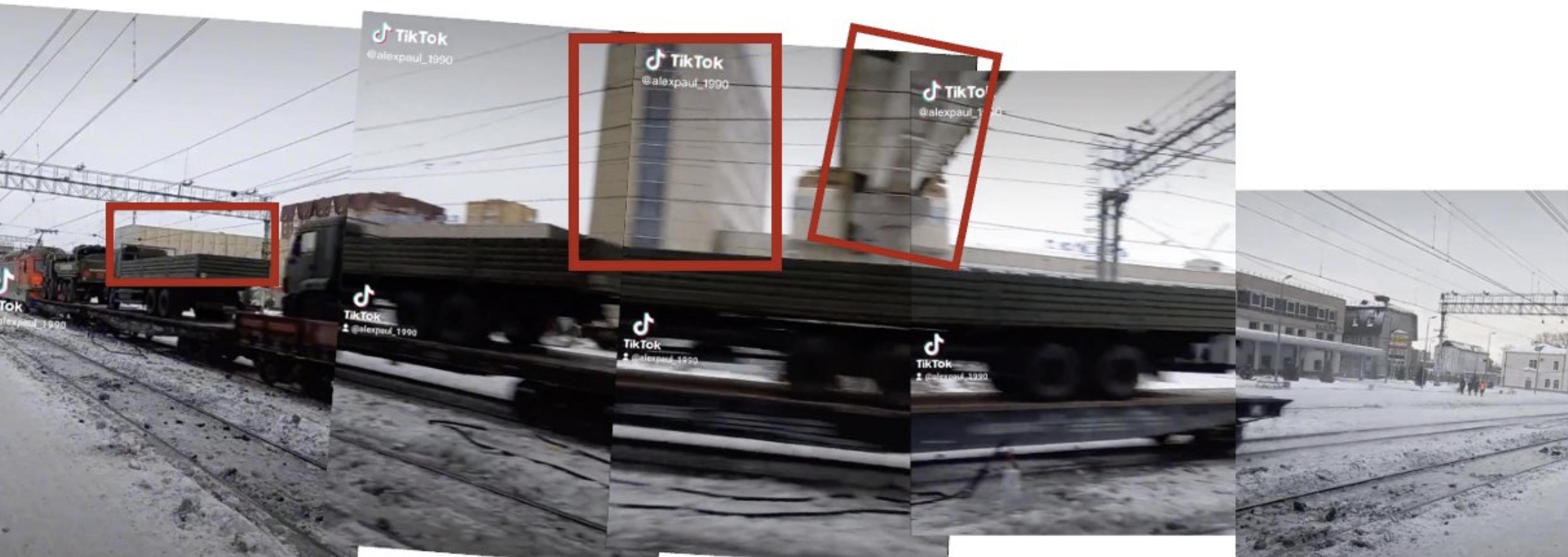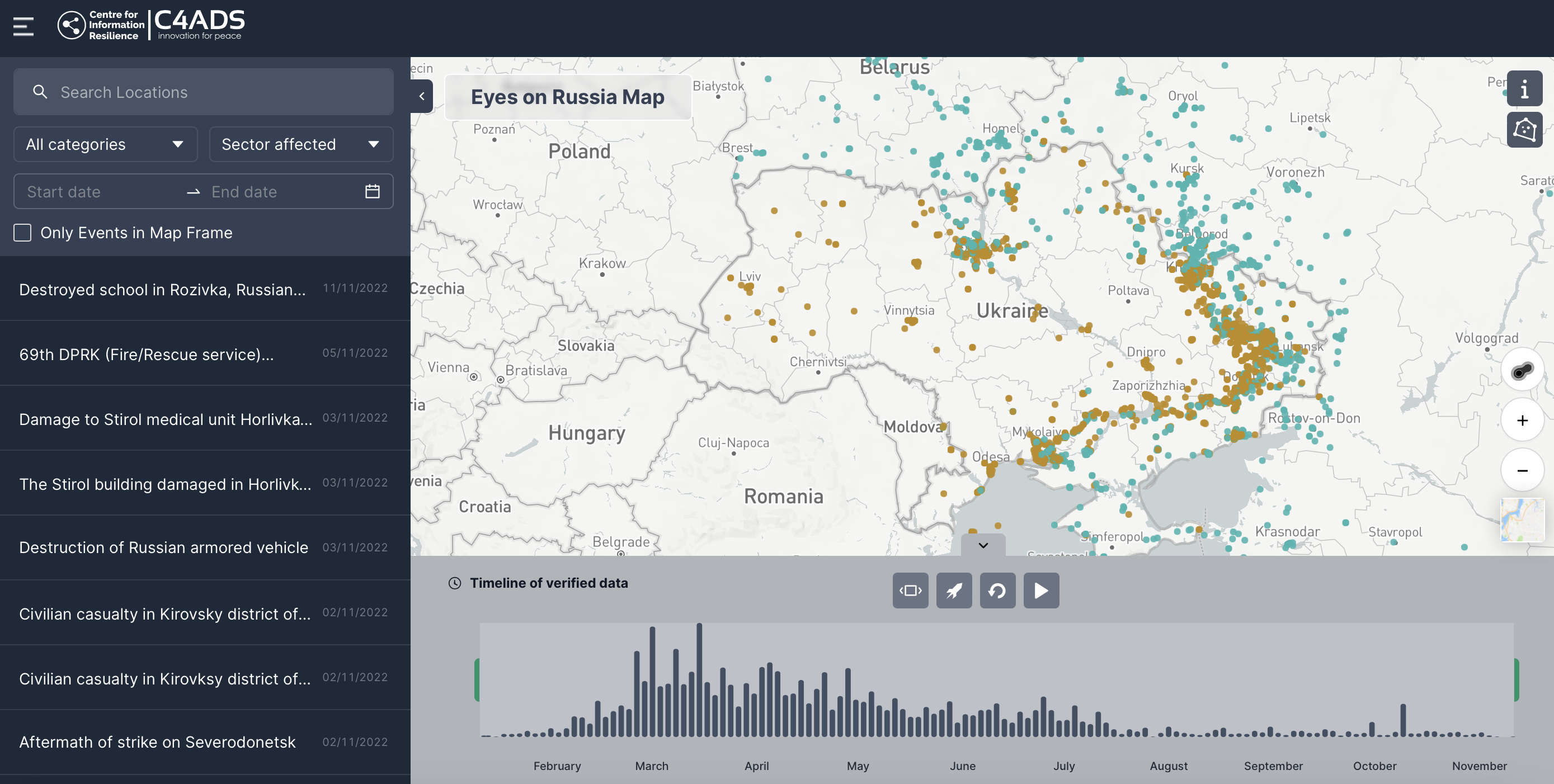It’s been an exceptionally busy year at the Centre for Information Resilience. Russia’s invasion of Ukraine has, rightly, dominated the news agenda. From January onwards, our analysts were verifying and mapping Russian military movements. From that, our Eyes on Russia project was born.

Like our other open source projects, it’s much more than just plotting developments on a map: at its heart, the project is about justice and accountability for the people affected. We knew that the Kremlin would try everything to distort the information environment. Our resolve to stop them remains.
Our team was determined to create resources that policymakers, journalists, NGOs, and legal bodies could rely on. Twelve months later, we host one of the largest databases of incidents from the war. We’ve partnered with dozens of media outlets including AP, the BBC, CNN, the Guardian, Financial Times, Sky News, the New Statesman, VICE News, the London Times, New York Magazine, the Washington Post, and others to provide verified stories driven by open source.
Our own investigators have exposed hundreds of examples of Russia’s malign approach to its war. We’ve published stories on the deliberate targeting of civilian infrastructure, exposed the expansion of mass graves across the country, and even revealed how the Kremlin was weaponizing children through disinformation efforts.
The data behind these stories is available to everyone, in the form of our new Eyes on Russia map. It hosts thousands of verified entries, with an incredible array of tools to sort the data. Yet none of our work would be possible without our brilliant volunteers. Since the conflict began, we’ve worked with over 150 volunteers from across the world. A number have since joined us full-time, including several Ukrainians. Their dedication and bravery in the face of the destruction of their home has been awe-inspiring.

This year, we’ve seen similar brilliant work from our staff from Myanmar and Afghanistan. On the Myanmar Witness and Afghan Witness projects, they endeavour to investigate and verify human rights incidents from their homelands. Both projects have been relentlessly busy.
In Myanmar, we’ve exposed the use of Russian-supplied fighter aircraft in attacks against civilians, and published reports into mass killings across the country, including the tragic attack on a concert in northern Myanmar. Our work has been cited in over 2000 media reports – most recently by ABC, where our investigators verified a helicopter attack that killed six children.
We’ve produced comprehensive arms guides, allowing journalists, lawyers, and NGOs the crucial data they need to help identify the perpetrators involved in human rights incidents. Our innovative heat map has exposed how villages have been targeted and destroyed across the country.
In Afghanistan, we helped expose the reality of the Taliban. Using open source, our investigators provided evidence linking one unit of Taliban with the execution of ten men in the Dara District, prompting headlines around the world (and the Taliban banning the use of smart phones in the region). Our team has been crucial in geolocating and verifying incidents of terrorism and violence against women.
Next year, we’ll be building on this strand of work, looking specifically at the links between online harm and real-world violence, whether in Myanmar, Afghanistan, or indeed closer to home. This autumn, we launched the Hypatia Project, designed to further document and understand online abuse and the causal link with offline violence. In the coming months, we’ll be launching a major report into our findings.
Alongside this important work, we’ll be expanding our Eyes on Russia project, building on our work in Afghanistan and Myanmar, and launching a campaign to help fight disinformation in Europe around the war in Ukraine. We’ll also be announcing the launch of two new major open source projects early next year.
This year, threats to the information space and objective truth from a number of actors (foreign and domestic!) have continued. We’ve witnessed terrible violence and loss around the world. Despite this, we at the centre are finishing 2022 with hope. We’ve been inspired by collaborations this year and been honoured to work with some amazing individuals and organisations from across the world. In particular, the manner in which the open source community rallied around Ukraine to rapidly debunk disinformation and verify events on the ground was truly inspiring. It’s a reminder to us all that the scale of the challenges we face – and the battle for truth and rationalism – demand collective action.
Bring on 2023. As ever, thank you for your support.
Adam, Ross & the CIR team.

